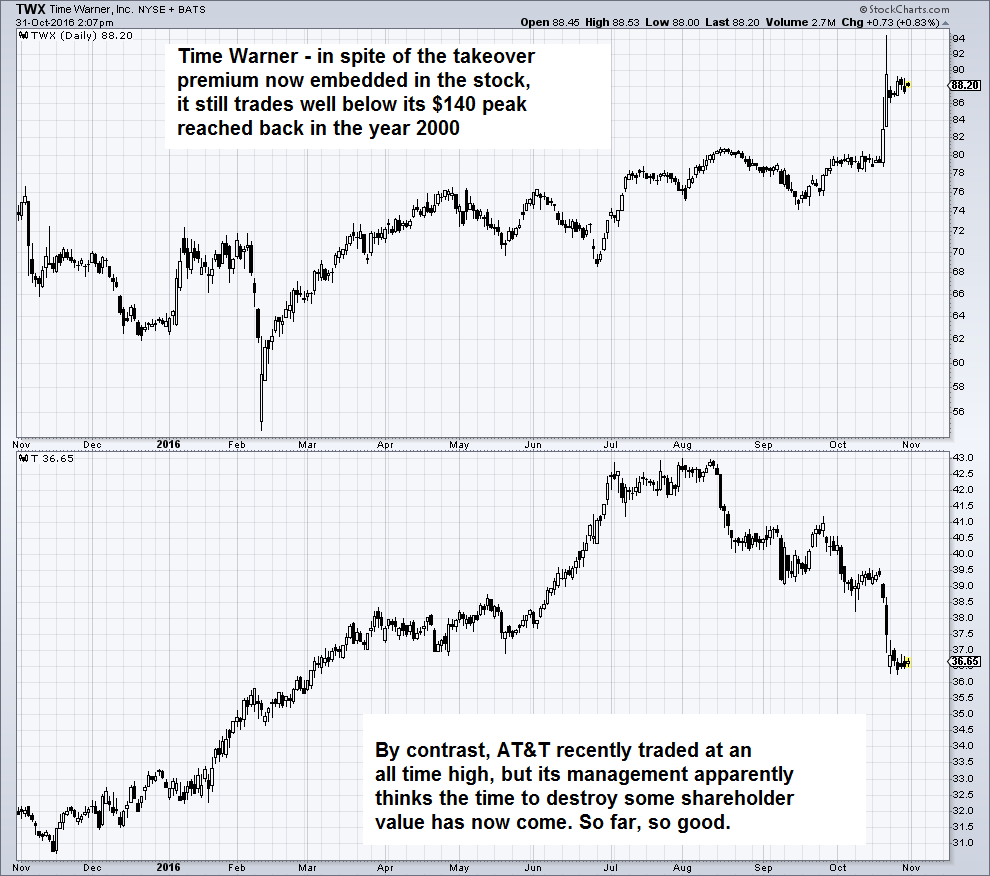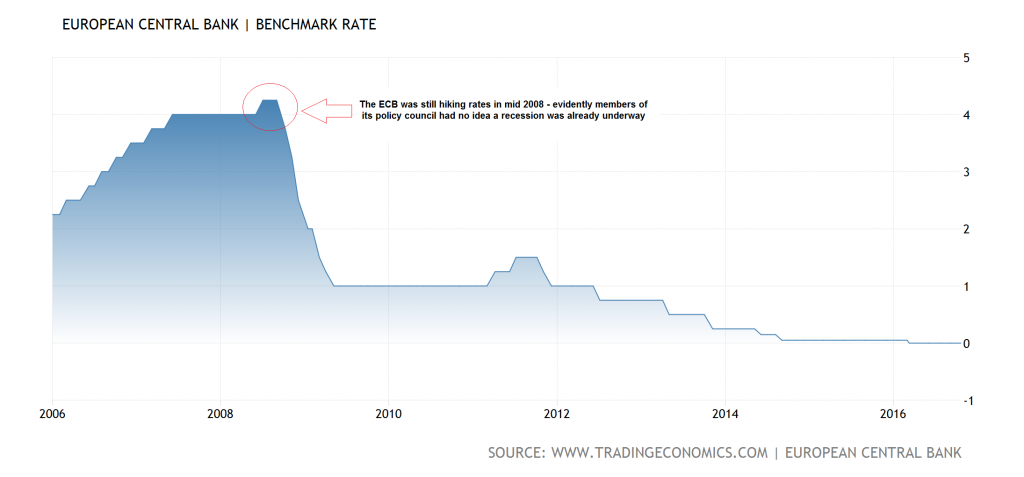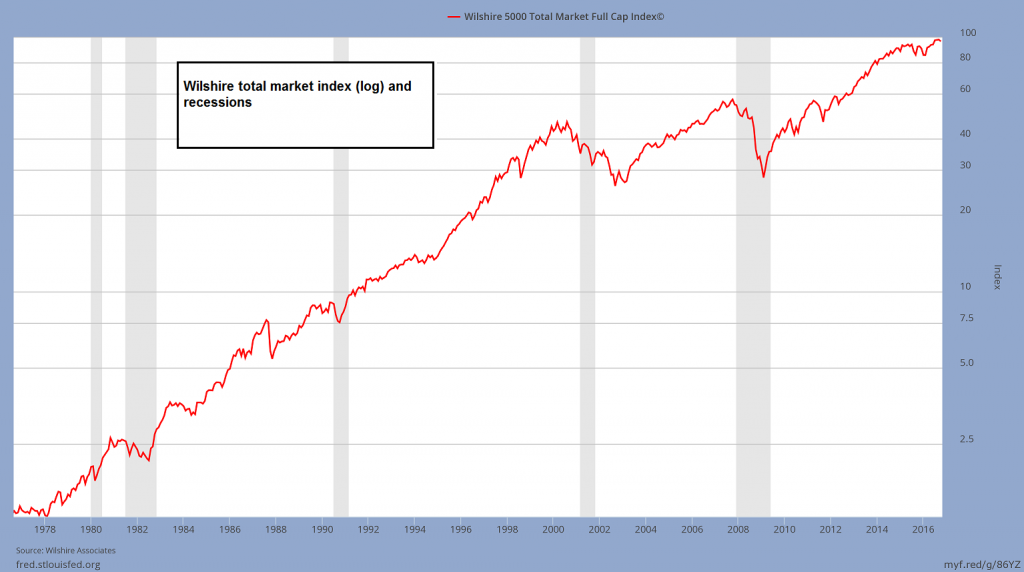Only Sell Stocks in Recessions?
We were recently made aware of an interview at Bloomberg, in which Tony Dwyer of Cannacord and Brian Wieser of Pivotal Research were quizzed on the recently announced utterly bizarre AT&T (NYSE:T) – Time Warner Inc (NYSE:TWX) merger. We were actually quite surprised that AT&T wanted to buy the giant media turkey. Prior to the offer, TWX still traded 50% below the high it had reached 17 years ago.

The merger of AT&T and TWX simply doesn’t appear to make much sense. It certainly is a symptom of loose monetary policy though.
The merger as such is actually not what we want to discuss though. Rather, it is a remark of Mr. Dwyer’s regarding the stock market in general and what the recent merger mania is signaling. He makes two major points in the course of the conversation. For one thing, he notes that the merger (along with many other mergers that have recently been announced) is the result of the extremely easy availability of credit.
This is undoubtedly true and he rightly avers that all of this will end badly. At the same time he believes though that it represents a great opportunity for investors currently – a point he thinks is not receiving the attention it deserves. This in turn is based on his assertion that one should never sell stocks, even if the market misbehaves by going down a bit, as long as there is no recession.
You can watch a video of the interview here.
Tony Dwyer and Brian Wieser opine on the T-TWX merger. Dwyer’s remark on when to sell or not sell stocks is of particular interest to us.
The Problem with Predictions
The problem with this is of course that by the time everybody realizes that a recession is actually unfolding, the stock market is usually already half-way to making its bear market lows. Mainstream economists and central planning bureaucrats are usually particularly clueless when it comes to forecasting recessions. They don’t even recognize them when they are staring them into the face.
As an example, shortly before the market crashed in 2008, nearly everybody denied that a recession might already be in train or might be imminent. The ECB actually hiked its main refinancing rate in the summer of 2008. It is fair to say that no-one at the ECB had even the foggiest idea that an economic contraction was already underway.

The ECB hiked its main refinancing rate in the summer of 2008. By this time, the recession was approximately 8 months old.
Later, NBER backdated the beginning of the recession to November of 2007. So the argument that one should not sell in the absence of a recession is really not sensible, since it is predicated on the notion that 1) people will actually be able to recognize that there is a recession, and 2) will then act on this recognition in a timely manner in the stock market.
Obviously, that is not how things usually work out. One must not only be able to successfully predict the advent of a downturn, but also act on this forecast before too many other market participants decide to do so. This is obviously not easy, but waiting for NBER or some other authority to confirm a recession will definitely be useless from a timing perspective.
It is of course true that stock market declines very often go hand in hand with recessions. Historically the stock market often tends to lead the economy in economic downturns, but not always. The lead times are quite variable and sometimes very painful market declines can occur without a recession (such as in 1987).
In order to successfully estimate likely long term market returns one doesn’t really need to forecast the timing of recessions anyway – one mainly needs to consider valuations (price/earnings, price/sales, Q ratio, etc.).

In the last recession the stock market’s lead time was very short – but the recession was only officially recognized after it had been underway for almost a year already.
In the short to medium term the market can obviously deviate considerably from what valuations suggest about its long term outlook, and traders focused on shorter time frames are usually better served by employing technical analysis, or even better, a mixture of fundamental and technical analysis.
Lastly, investors cannot possibly escape the losses generated by a market decline collectively. Consider someone who is timing the market perfectly and is selling right at the top. Someone else has to buy the shares he is selling, so the buyer will then make the losses the seller manages to avoid. This continues down the line with every transaction made while the bear market lasts.
Conclusion
Investors as a group cannot be saved from suffering the losses a bear market inflicts, only the distribution of these losses is open to question. Per experience, only very few investors will actually be able to sidestep a bear market or even manage to profit from it.
This small group of investors will mainly do so by successfully predicting or recognizing a downturn that the vast majority of market observers will swear is nowhere near. In short, one has to adopt what will appear as a contrarian position and do so in a timely fashion; while this is a tall order, those who wait for official confirmation of a recession will have waited too long.
An alternative to making correct forecasts is to use a trailing stop or some other type of systematic approach to time exit and entry into the market. To simply hold on in the face of excessive valuations and excessive credit growth “because there is no recession” seems a very risky strategy by comparison.
